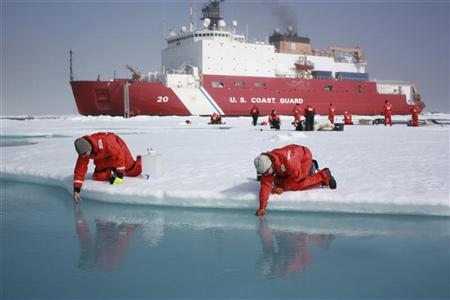Russia to spend $3.5 billion on 35 planes from Boeing
Reuters – 1 hr 18 mins ago
 Reuters/Reuters - The Boeing logo is seen on a Boeing 787 Dreamliner airplane in Long Beach, California March 14, 2012. REUTERS/Lucy Nicholson
Reuters/Reuters - The Boeing logo is seen on a Boeing 787 Dreamliner airplane in Long Beach, California March 14, 2012. REUTERS/Lucy Nicholson
MOSCOW (Reuters) - State-owned industrial and defense vehicle Russian Technologies is to buy 35 737 MAX planes from U.S. aerospace company Boeing Co for $3.5 billion, the companies said in a joint statement on Tuesday.
Boeing has predicted that Russia and neighboring states will take delivery of 1,140 new aircraft over the next 20 years, valued at $130 billion.
"Russia is becoming a vital partner in everything that we do," said Raymond Connor, president and CEO of Boeing at a press conference in Moscow. "It isn't only vital in terms of our manufacturing but it is also vital to us with respect to engineering, space, and of course services."
The Chicago-based aerospace company, which has been working in Russia for 30 years according to its website, said the first delivery would be in August 2018.
(Reporting By Gleb Stolyarov and Sonia Elks; writing by Megan Davies. Editing by Jane Merriman)
EXPLORE RELATED CONTENT
1 - 4 of 20
U.S. looks to old Arctic ship logs for climate change clues
By Ian Simpson | Reuters – Fri, Oct 26, 2012 Reuters/Reuters - Scientists Jens Ehn (L) and Christie Wood scoop water from melt ponds on sea ice in the Chukchi Sea in the Arctic Ocean in this July 10, 2011 NASA handout photo obtained by Reuters June 10,
Reuters/Reuters - Scientists Jens Ehn (L) and Christie Wood scoop water from melt ponds on sea ice in the Chukchi Sea in the Arctic Ocean in this July 10, 2011 NASA handout photo obtained by Reuters June 10,
WASHINGTON (Reuters) - A project to help track Arctic climate change using volunteers to transcribe U.S. ship logs online was launched on Wednesday by the National Archives and the National Oceanic and Atmospheric Administration (NOAA).
Using citizen scientists to transcribe thousands of pages of logbooks from Navy, Coast Guard and other ships from 1850 to World War Two will fill a big data gap, NOAA Administrator Jane Lubchenco said.
Scientists in recent decades have gotten weather data from satellites and ground observations, and such tools as ice samples show ancient patterns, she said. But the archived logs could establish a baseline of historical weather data.
"Naval and Coast Guard records are an invaluable window into the past which will let us know what it was like then," she told Reuters after a news conference.
NOAA scientists have said that the Arctic is undergoing dramatic change as world temperatures climb. Arctic sea ice shrank to a record low of 1.32 million square miles (3.41 million square kilometers) by mid-September.
Project organizers, which include science web portal Zooniverse, hope to enlist thousands of volunteers to transcribe scanned pages from logbooks. The pages will be loaded onto Old Weather, an online weather data project (www.oldweather.org).
Information also could be used by scientists in other fields, as well as historians and genealogists, organizers said. Navy logs carried weather observations 24 times a day.
Mark Mollan, a reference archivist and a project organizer, said the National Archives had 1,000 boxes of Arctic ship logs. Each page put online will be transcribed three times to eliminate errors, he said.
In the first Old Weather project, started in 2010, 16,400 volunteers have transcribed 1.6 million weather observations from British Navy ship logs.
Four bulky logbooks, all with Arctic observations in neat 19th century handwriting, were displayed at the news conference.
The logs included one from the doomed 1879 Arctic voyage of the Jeannette, a U.S. Navy ship that sank after being trapped in ice off Russia. The commander starved to death and 18 other expedition members died.
(Reporting by Ian Simpson; editing by Philip Barbara)








No comments:
Post a Comment
Note: Only a member of this blog may post a comment.